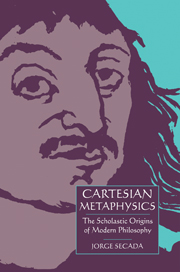Book contents
- Frontmatter
- Contents
- Preface
- Abbreviations
- Prologue
- Part I The unity of Cartesian metaphysics
- 1 Descartes's essentialist metaphysics
- 2 Scepticism, Scholasticism, and the origins of Descartes's philosophy
- 3 Cartesian real essences
- Part II Ideas and the road from essence to existence
- Part III Cartesian substances
- Epilogue
- Notes
- References
- Index
2 - Scepticism, Scholasticism, and the origins of Descartes's philosophy
Published online by Cambridge University Press: 22 September 2009
- Frontmatter
- Contents
- Preface
- Abbreviations
- Prologue
- Part I The unity of Cartesian metaphysics
- 1 Descartes's essentialist metaphysics
- 2 Scepticism, Scholasticism, and the origins of Descartes's philosophy
- 3 Cartesian real essences
- Part II Ideas and the road from essence to existence
- Part III Cartesian substances
- Epilogue
- Notes
- References
- Index
Summary
Descartes's education at the Jesuit school in La Flèche
René Descartes, seigneur du Perron, was born into a family of the expanding provincial lower nobility or higher bourgeoisie in the town of La Haye in Touraine on 31 March 1596. His mother, Jeanne Brochard, died a few days after giving birth to a still-born child in May 1597. His father Joachim (a magistrate at the Parliament at Rennes who in 1626 was appointed to the court that condemned Henri de Talleyrand-Périgord, the Count of Chalais, for conspiracy against the king) married again, so Descartes received his first education from his maternal grandmother, Jeanne Sain, and a wet-nurse whom he would remember until his death (see AT, V, 470). Little is known of the memories which he preserved from these first years or of the effect that they might have had later in his life: the most remarkable is perhaps his weakness for convergent strabismus or cross-eye, which derived from his precocious love for a little girl who suffered from the defect (see AT, V, 57).
After this initial schooling within his family Descartes was sent in 1607 to the Jesuit school at La Flèche in Anjou. This institution had opened its doors in 1604 under the auspices of Henry IV. It is reported that the king wished to establish the best school in France there. Descartes stayed for almost nine years.
- Type
- Chapter
- Information
- Cartesian MetaphysicsThe Scholastic Origins of Modern Philosophy, pp. 27 - 54Publisher: Cambridge University PressPrint publication year: 2000



